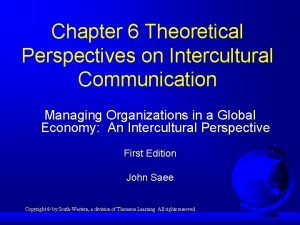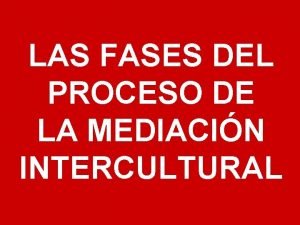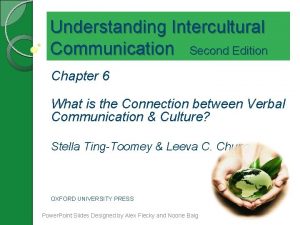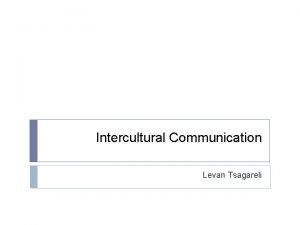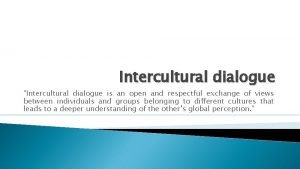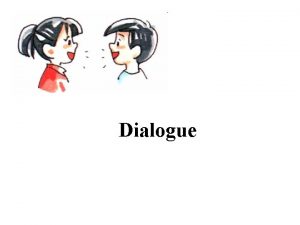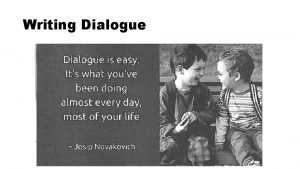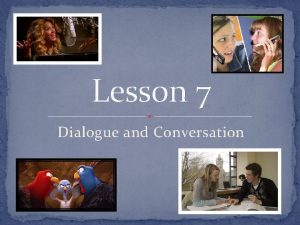INTERCULTURAL DIALOGUE 2008 European Year of Intercultural Dialogue









- Slides: 9

INTERCULTURAL DIALOGUE 2008: European Year of Intercultural Dialogue: • Recognize Europe’s multicultural diversity • An opportunity to build a complex society in which the different cultural identities coexist pacifically and constructively • Dialogue doesn´t mean uniformity

General objectives • To promote intercultural dialogue as a process that allows the people living in the Union to improve their capacity to live in an open and varied cultural surrounding. • To make the young people aware of the need to develop an active and open European citizenship, respectful of diversity and based on common values. • To highlight the contribution of the different cultures and expressions to the patrimony and ways of life of the E. U.

Specific Objectives • To increase the sensibilization of all living in the E. U. of the importance of commitment to intercultural dialogue in daily life. • To encourage the role of education in the learning of diversity, improve the understanding of other cultures and develop good social practises. • To contribute to exploring new approaches to intercultural dialogue.

A Task for Educators NEW SCHOOL CLASSICAL EDUCATION Builds citizensip on the basis of “national” cultures (mother tongue, national history, patriotic heroes, own literature) Must defend: • The acknowledgement of the minorities coming from other places • The international contact • A real project of European Union. How?

A Task for Educators How? • With school programs that show human diversity • With new methodologies and didactical organizations, such as: - shelter programs for newcomers - interfamily links (celebrations, food, music and art festivals) • With teachers in a permanent training process, conscious of their role as: - cultural agents - educators in the values of tolerance - social activators for the participation of children and youngsters in their growing up and integration process.

Values in conflict • Living together among non-equals means understanding and respecting each other. • But not everything is tolerable, not everything is respectable. • Assuming cultual diversity doesn´t mean “all is acceptable” because we cannot permit any cultural tradition to damage the right of every individual to moral, personal, physical or ideological integrity. Zero tolerance to any culture that allows discrimination, subordination, or exclusion.

Why films? • Even tough in the academic world the audiovisual methods are considered to be responsible for the crisis of reading and the cultural empoverishment of the last generations, we must be able to understand films as another tool, with its own language, its grammar, its syntax. • School in the 21 st century should be the stage on which to mingle the written, oral, audiovisual, hipertextual cultures we have at our disposal today. • Films are undoubtedly attractive for young people, effective to make the complex evident, to tell stories, to entertain, to communicate, to show values, to empathize.

The main themes • We propose a reflective method leading to sensitivity and understanding, beyond cinema as show, as pure entertainment. • Our intention: to deal with the matter of intercultural coexistence in the search of competences which enable us to see diversity as an opportunity of enrichment for all

Themes of our films • Racism / xenophobia • Migrations • New sexual identities • Living together of young people of different cultures • Ethnical majorities and minorities






